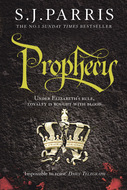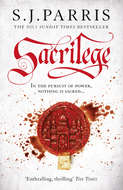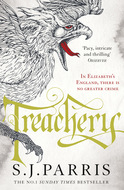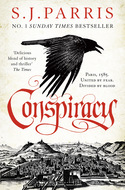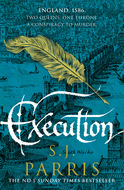Kitap dosya olarak indirilemez ancak uygulamamız üzerinden veya online olarak web sitemizden okunabilir.
Kitabı oku: «Heresy», sayfa 2
PART ONE
ONE
On a horse borrowed from the French ambassador to the court of Queen Elizabeth of England, I rode out across London Bridge on the morning of 20th May 1583. The sun was strong already, though it was not yet noon; diamonds of light scattered across the ruffled surface of the wide Thames and a warm breeze lifted my hair away from my face, carrying with it the sewer stinks of the river. My heart swelled with anticipation as I reached the south bank and turned right along the river towards Winchester House, where I would meet the royal party to embark upon our journey to the renowned University of Oxford.
The palace of the bishops of Winchester was built of red brick in the English style around a courtyard, its roof decorated with ornate chimneys over the great hall with its rows of tall perpendicular windows facing the river. In front of this a lawn sloped down to a large wharf and landing place where I now saw, as I approached, a colourful spectacle of people thronging the grass. Snatches of tunes carried through the air as musicians rehearsed, and half of London society appeared to have turned out in its best clothes to watch the pageant in the spring sunshine. By the steps, servants were making ready a grand boat, decked out with rich silk hangings and cushions tapestried in red and gold. At the front were seats for eight oarsmen, and at the back an elaborate embroidered canopy sheltered the seats. Jewel-coloured banners rippled in the light wind, catching the sunlight.
I dismounted, and a servant came to hold the horse while I walked towards the house, eyed suspiciously by various finely dressed gentlemen as we passed. Suddenly I felt a fist land between my shoulder blades, almost knocking me to the ground.
‘Giordano Bruno, you old dog! Have they not burned you yet?’
Recovering my balance, I spun around to see Philip Sidney standing there grinning from ear to ear, his arms wide, legs planted firmly astride, his hair still styled in that peculiar quiff that stuck up at the front like a schoolboy hastened out of bed. Sidney, the aristocratic soldier-poet I had met in Padua as I fled through Italy.
‘They’d have to catch me first, Philip,’ I said, smiling broadly at the sight of him.
‘It’s Sir Philip to you, you churl – I’ve been knighted this year, you know.’
‘Excellent! Does that mean you’ll acquire some manners?’
He threw his arms around me then and thumped me heartily on the back again. Ours was a curious friendship, I reflected, catching my breath and embracing him in return. Our backgrounds could not have been more different – Sidney was born into one of the first families of the English court, as he had never tired of reminding me – but in Padua we had immediately discovered the gift of making one another laugh, a rare and welcome thing in that earnest and often sombre place. Even now, after six years, I felt no awkwardness in his company; straight away we had fallen into our old custom of affectionate baiting.
‘Come, Bruno,’ Sidney said, putting an arm around my shoulders and leading me down the lawn towards the river. ‘By God, it is a fine thing to see you again. This royal visitation to Oxford would have been intolerable without your company. Have you heard of this Polish prince?’
I shook my head. Sidney rolled his eyes.
‘Well, you will meet him soon enough. The Palatine Albert Laski – a Polish dignitary with too much money and too few responsibilities, who consequently spends his time making a nuisance of himself around the courts of Europe. He was supposed to travel from here to Paris, but King Henri of France refuses to allow him into the country, so Her Majesty is stuck with the burden of his entertainment a while longer. Hence this elaborate pageant to get him away from court.’ He waved towards the barge, then glanced around briefly to make sure we were not overheard. ‘I do not blame the French king for refusing his visit, he is a singularly unbearable man. Still, it is quite an achievement – I can think of one or two taverns where I am refused entry, but to be barred from an entire country requires a particular talent for making yourself unwelcome. Which Laski has by the cartload, as you shall see. But you and I shall have a merry time in Oxford none the less – you will amaze the dullards there with your ideas, and I shall look forward to basking in your glory and showing you my old haunts,’ he said, punching me heartily again on the arm. ‘Although, as you know, that is not our whole purpose,’ he added, lowering his voice.
We stood side by side looking out over the river, busy then with little crafts, wherries and small white-sailed boats criss-crossing the shining water in the spring sun, which illuminated the fronts of the handsome brick and timber buildings along the opposite bank, a glorious panorama with the great spire of St Paul’s church towering over the rooftops far to the north. I thought what a magnificent city London was in our age, and how fortunate I was to be here at all, and in such company. I waited for Sidney to elaborate.
‘I have something for you from my future father-in-law, Sir Francis Walsingham,’ he whispered, his eyes still fixed on the river. ‘See what a knighthood gets me, Bruno – a job as your errand boy.’ He drew himself upright and looked about, shielding his eyes with his hand as he peered towards the mooring-place of our craft, before reaching for the oilskin bag he carried and pulling from it a bulging leather purse. ‘Walsingham sent this for you. You may incur certain expenses in the course of your enquiries. Call it an advance against payment.’
Sir Francis Walsingham. Queen Elizabeth’s Principal Secretary of State, the man behind my unlikely presence on this royal visitation to Oxford; even his name made my spine prickle.
We walked a little further off from the body of the crowd gathered to marvel as the barge was decked with flowers for our departure. Beside it, a group of musicians had struck up a dance tune and we watched the crowd milling around them.
‘But now tell me, Bruno – you have not set your sights upon Oxford merely to debate Copernicus before a host of dull-witted academicians,’ Sidney continued, in a low voice. ‘I knew as soon as I heard you had come to England that you must be on the scent of something important.’
I glanced quickly around to be sure no one was within earshot.
‘I have come to find a book,’ I said. ‘One I have sought for some time, and now I believe it was brought to England.’
‘I knew it!’ Sidney grabbed my arm and drew me closer. ‘And what is in this book? Some dark art to unlock the power of the universe? You were dabbling in such things in Padua, as I recall.’
I could not tell whether he was mocking me still, but I decided to trust to what our friendship had been in Italy.
‘What would you say, Philip, if I told you the universe was infinite?’
He looked doubtful.
‘I would say that this goes beyond even the Copernican heresy, and that you should keep your voice down.’
‘Well, this is what I believe,’ I said, quietly. ‘Copernicus told only half the truth. Aristotle’s picture of the cosmos, with the fixed stars and the six planets that orbit the earth – this is pure falsehood. Copernicus replaced the Earth with the Sun as the centre of the cosmos, but I go further – I say there are many suns, many centres – as many as there are stars in the sky. The universe is infinite, and if this is so, why should it not be populated with other earths, other worlds, and other beings like ourselves? I have decided it will be my life’s work to prove this.’
‘How can it be proved?’
‘I will see them,’ I said, looking out over the river, not daring to watch his reaction. ‘I will penetrate the far reaches of the universe, beyond the spheres.’
‘And how exactly will you do this? Will you learn to fly?’ His voice was sceptical now; I could not blame him.
‘By the secret knowledge contained in the lost book of the Egyptian sage Hermes Trismegistus, who first understood these mysteries. If I can trace it, I will learn the secrets necessary to rise up through the spheres by the light of divine understanding and enter the Divine Mind.’
‘Enter the mind of God, Bruno?’
‘No, listen. Since I saw you last I have studied in depth the ancient magic of the Hermetic writings and the Cabala of the Hebrews, and I have begun to understand such things as you would not believe possible.’ I hesitated. ‘If I can learn how to make the ascent Hermes describes, I will glimpse what lies beyond the known cosmos – the universe without end, and the universal soul, of which we are all a part.’
I thought he might laugh then, but instead he looked thoughtful.
‘Sounds like dangerous sorcery to me, Bruno. And what would you prove? That there is no God?’
‘That we are all God,’ I said, quietly. ‘The divinity is in all of us, and in the substance of the universe. With the right knowledge, we can draw down all the powers of the cosmos. When we understand this, we can become equal to God.’
Sidney stared at me in disbelief.
‘Christ’s blood, Bruno! You cannot go about proclaiming yourself equal to God. We may not have the Inquisition here but no Christian church will hear that with equanimity – you will be straight for the fire.’
‘Because the Christian church is corrupt, every faction of it – this is what I want to convey. It is only a poor shadow, a dilution of an ancient truth that existed long before Christ walked the earth. If that were understood, then true reform of religion might be possible. Men might rise above the divisions for which so much blood has been spilled, and is still being spilled, and understand their essential unity.’
Sidney’s face turned grave.
‘I have heard my old tutor Doctor Dee speak in this way. But you must be careful, my friend – he collected many of these manuscripts of ancient magic during the destruction of the monastic libraries, and he is called a necromancer and worse for it, not just by the common people. And he is a native Englishman, and the queen’s own astrologer too. Do not get yourself a reputation as a black magician – you are already suspicious as a Catholic and a foreigner.’ He stepped back and looked at me with curiosity. ‘This book, then – you believe it is to be found in Oxford?’
‘When I was living in Paris, I learned that it was brought out of Florence at the end of the last century and, if my advisor spoke the truth, it was taken by an English collector to one of the great libraries here, where it lies unremarked because no one who has handled it has understood its significance. Many of the Englishmen who travelled in Italy were university men and left their books as bequests, so Oxford is as good a place as any to start looking.’
‘You should start by asking John Dee,’ Sidney said. ‘He has the greatest library in the country.’
I shook my head.
‘If your Doctor Dee had this book, he would know what he held in his hands, and he would have made this revelation known by some means. It is still to be discovered, I am certain.’
‘Well, then. But don’t neglect Walsingham’s business in Oxford.’ He slapped me on the back again. ‘And for Christ’s sake don’t neglect me, Bruno, to go ferreting in libraries – I shall expect some gaiety from you while we are there. It’s bad enough that I must play nursemaid to that flatulent Pole Laski – I’m not planning to spend every evening with a clutch of fusty old theologians, thank you. You and I shall go roistering through the town, leaving the women of Oxford bow-legged in our wake!’
‘I thought you were to marry Walsingham’s daughter?’ I raised an eyebrow, feigning shock.
Sidney rolled his eyes.
‘When the queen deigns to give her consent. In the meantime, I do not consider myself bound by marriage vows. Anyway, what of you, Bruno? Have you been making up for your years in the cloister on your way through Europe?’ He elbowed me meaningfully in the ribs.
I smiled, rubbing my side.
‘Three years ago, in Toulouse, there was a woman. Morgana, the daughter of a Huguenot nobleman. I gave private tuition to her brother in metaphysics, but when her father was not at home she would beg me to stay on and read with her. She was hungry for knowledge – a rare quality in women born to wealth, I have found.’
‘And beautiful?’ Sidney asked, his eyes glittering.
‘Exquisite.’ I bit my lip, remembering Morgana’s blue eyes, the way she would try and coax me to laughter when she thought I grew too melancholy. ‘I courted her in secret, but I think I always knew it was only for a season. Her father wanted her to marry a Huguenot aristocrat, not a fugitive Italian Catholic. Even when I became a Professor of Philosophy at the University of Toulouse and finally had the means of supporting myself, he would not consent, and he threatened to use all his influence in the city to destroy my name.’
‘So what happened?’ Sidney asked, intrigued.
‘She begged me to run away with her.’ I sighed. ‘I almost allowed myself to be persuaded, but I knew in my heart that it would not have been the future either of us wanted. So I left one night for Paris, where I ploughed all my energies into my writing and my advancement at court. But I often wonder about the life I turned my back on, and where I might have been now.’ My voice trailed away as I lowered my eyes again, remembering.
‘Then we should not have had you here, my friend. Besides, she’s probably married to some ageing duke by now,’ Sidney said heartily.
‘She would have been,’ I agreed, ‘had she not died. Her father arranged a marriage to one of his friends but she had an accident shortly before the wedding. Drowned. Her brother wrote and told me.’
‘You think it was by her own hand?’ Sidney asked, his eyes dramatically wide.
‘I suppose I will never know.’
I fell silent then, and gazed out across the water.
‘Well, sorry about that,’ Sidney said after a few moments, clapping me on the back in that matter-of-fact way the English have, ‘but still – the women of King Henri’s court must have provided you with plenty of distractions, eh?’
I regarded him for a moment, wondering if the English nobility really did have as little fine feeling as they pretended, or if they had developed this manner as a way of avoiding painful emotion.
‘Oh yes, the women there were beautiful, certainly, and happy enough to offer their attentions at first, but I found them sadly lacking in worthwhile conversation,’ I said, forcing a smile. ‘And they found me sadly lacking in fortune and titles for any serious liaison.’
‘Well, there you are, Bruno – you are destined for disappointment if you seek out women for their conversation.’ Sidney shook his head briefly, as if the idea were absurd. ‘Take my advice – sharpen your wits in the company of men, and look to women only for life’s softer comforts.’
He winked broadly and grinned.
‘Now I must oversee the arrangements or we shall never be on our way, and we are to dine at the palace of Windsor this evening so we need to make good progress. They say there will be a storm tonight. The queen will not be present, naturally,’ he said, noting my raised eyebrows. ‘I’m afraid the responsibility of entertaining the palatine is ours alone, Bruno, until we reach Oxford. Steel yourself and pray to that universal soul of yours for fortitude.’
‘I would not be the one to boast, but my friends do consider me to be something of a poet, Sir Philip,’ the Palatine Laski was saying in his high-pitched voice, which always sounded as if he was voicing a grievance, as our boat approached Hampton Court. ‘I had in mind that if we tire of the disputations at the university’ – here he cast a pointed glance at me – ‘you and I might devote some of our stay in Oxford to reading one another’s poetry and advising on it, as one sonneteer to another, what say you?’
‘Then we must include Bruno in our parley,’ Sidney said, flashing me a conspiratorial grin, ‘for in addition to his learned books, he has written a comic drama in verse for the stage, have you not, Bruno? What was it called?’
‘The Torch-bearers,’ I muttered, and turned back to contemplate the view. I had dedicated the play to Morgana and it was always associated with memories of her.
‘I have not heard of it,’ said the palatine dismissively.
Before our party had even reached Richmond I found myself in complete agreement with my patron, King Henri III of France: the Palatine Laski was unbearable. Fat and red-faced, he had a wholly misplaced regard for his own importance and a great love of the sound of his own voice. For all his fine clothes and airs, he was clearly not well acquainted with the bath-house, and under that warm sun a fierce stink came off him which, mingled with the vapours from the brown Thames at close quarters, was distracting me from what should have been an entertaining journey.
We had launched from the wharf at Winchester House with a great fanfare of trumpets; a boat filled with musicians had been charged to keep pace with us, so that the palatine’s endless monologue was accompanied by the twitterings and chirpings of the flute players to our right. To add to my discomfort, the flowers with which the barge had been so generously bedecked were making me sneeze. I sank back into the silk cushions, trying to concentrate on the rhythmic splashing of the oars as we glided at a stately pace through the city, smaller boats making way on either side while their occupants, recognising the royal barge, respectfully doffed their caps and stared as we passed. For my part, I had almost succeeded in reducing the palatine’s babble to a background drone as I concentrated on the sights, and would have been content to enjoy the gentle green and wooded landscape on the banks as we left the city behind, but Sidney was determined to amuse himself by baiting the Pole and wanted my collaboration.
‘Behold, the great palace of Hampton Court, which once belonged to our queen’s father’s favourite, Cardinal Wolsey,’ he said, gesturing grandly towards the bank as we drew close to the imposing red-brick walls. ‘Not that he enjoyed it for long – such is the caprice of princes. But it seems the queen holds you in great esteem, Laski, to judge by the care she has taken over your visit.’
The palatine simpered unattractively.
‘Well, that is not for me to say, of course, but I think it is well-known by now at the English court that the Palatine Laski is granted the very best of Her Majesty’s hospitality.’
‘And now that she will not have the Duke of Anjou, I wonder whether we her subjects may begin to speculate about an alliance with Poland?’ Sidney went on mischievously.
The palatine pressed the tips of his stubby fingers together as if in prayer and pursed his moist lips, his little piggy eyes shining with self-congratulating pleasure.
‘Such things are not for me to say, but I have noticed in the course of my stay at court that the queen did pay me certain special attentions, shall we say? Naturally she is modest, but I think men of the world such as you and I, Sir Philip, who have not been shut up in a cloister, can always tell when a woman looks at us with a woman’s wants, can we not?’
I snorted with incredulity then, and had to disguise it as a sneezing fit. The minstrels finished yet another insufferably jaunty folk song and turned to a more melancholic tune, allowing me to lapse into reflective silence as the fields and woods slid by and the river became narrower and less noisome. Clouds bunched overhead, mirrored in the stretch of water before us, and the heat began to feel thick in my nostrils; it seemed Sidney had been right about the coming storm.
‘In any case, Sir Philip, I have taken the liberty of composing a sonnet in praise of the queen’s beauty,’ announced the palatine, after a while, ‘and I wonder if I might recite it for you before I deliver it to her delicate ears? I would welcome the advice of a fellow poet.’
‘You had much better ask Bruno,’ Sidney said carelessly, trailing his hand in the water, ‘his countrymen invented the form. Is that not so, Bruno?’
I sent him a murderous look and allowed my thoughts to drift to the horizon as the palatine began his droning recital.
If anyone had predicted, during those days when I begged my way from city to city up the length of the Italian peninsula, snatching teaching jobs when I could find them and living in the roadside inns and cheap lodgings of travellers, players and pedlars when I could not, that I would end up the confidant of kings and courtiers, the world would have thought them insane. But not me – I always believed in my own ability not only to survive but to rise through my own efforts. I valued wit more than the privileges of birth, an enquiring mind and hunger for learning above status or office, and I carried an implacable belief that others would eventually come to see that I was right; this lent me the will to climb obstacles that would have daunted more deferential men. So it was that from itinerant teacher and fugitive heretic, by the age of thirty-five I had risen almost as high as a philosopher might dream: I was a favourite at the court of King Henri III in Paris, his private tutor in the art of memory and a Reader in Philosophy at the great university of the Sorbonne. But France too was riven with religious wars then, like every other place I had passed through during my seven-year exile from Naples, and the Catholic faction in Paris under the Guise family were steadily gaining strength against the Huguenots, so much so that it was rumoured the Inquisition were on their way to France. At the same time, my friendship with the king and the popularity of my lectures had earned me enemies among the learned doctors at the Sorbonne, and sly rumours began to slip through the back streets and into the ears of the courtiers: that my unique memory system was a form of black magic and that I used it to communicate with demons. This I took as my cue to move on, as I had done in Venice, Padua, Genoa, Lyon, Toulouse and Geneva whenever the past threatened to catch up; like many religious fugitives before me, I sought refuge under the more tolerant skies of Elizabeth’s London, where the Holy Office had no jurisdiction, and where I hoped also to find the lost book of the Egyptian high priest Hermes Trismegistus.
The royal barge moored at Windsor late in the afternoon, where we were met by liveried servants and taken to our lodgings at the royal castle to dine and rest for the night before progressing to Oxford early the next day. Our supper was a subdued affair, perhaps partly because the sky had grown very dark by the time we arrived in the state apartments, requiring the candles to be lit early, and a heavy rain had begun to fall; by the time our meal was over the water was coursing down the tall windows of the dining hall in a steady sheet.
‘There will be no boat tomorrow if this continues,’ Sidney observed, as the servants cleared the dishes. ‘We will have to travel the rest of the way by road, if horses can be arranged.’
The palatine looked petulant; he had clearly enjoyed the languor of the barge.
‘I am no horseman,’ he complained, ‘we will need a carriage at the very least. Or we could wait here until the weather clears,’ he suggested in a brighter tone, leaning back in his chair and looking about him covetously at the rich furnishings of the palace dining room.
‘We have no time,’ Sidney replied. ‘Bruno’s great disputation before the whole university is the day after tomorrow and we must give our speaker enough leisure to prepare his devastating arguments, eh, Bruno?’
I turned my attention from the windows to offer him a smile.
‘In fact, I was just about to excuse myself for that very purpose,’ I said.
Sidney’s face fell.
‘Oh – will you not sit up and play cards with us a while?’ he asked, a note of alarm in his voice at the prospect of being left alone with the palatine for the evening.
‘I’m afraid I must lose myself in my books tonight,’ I said, pushing my chair back, ‘or this great disputation, as you call it, will not be worth hearing.’
‘I’ve sat through few that were,’ remarked the palatine. ‘Never mind, Sir Philip, you and I shall make a long night of it. Perhaps we may read to one another? I shall call for more wine.’
Sidney threw me the imploring look of a drowning man as I passed him, but I only winked and closed the door behind me. He was the professional diplomat here, he had been bred to deal with people like this. A great crack of thunder echoed around the roof as I made my way up an ornately painted staircase to my room.
For a long while I did not consult my papers or try to put my thoughts in order, but only lay on my bed, my mind as unsettled as the turbulent sky, which had turned a lurid shade of green as the thunder and lightning grew nearer and more frequent. The rain hammered against the glass and on the tiles of the roof and I wondered at the sense of unease that had edged out the morning’s thrill of anticipation. My future in England, to say nothing of the future of my work, depended greatly on the outcome of this journey to Oxford, yet I was filled with a strange foreboding; in all these rootless years of belonging nowhere, depending on no one but my own instinct for survival, I had learned to listen to the prickling of my moods. When I had intimations of danger, events had usually proved me right. But perhaps it was only that, once again, I was preparing to take on another shape, to become someone I was not.
I had been in London less than a week, staying as a guest of the French ambassador at the request of my patron, King Henri, who had reluctantly agreed to my plea to leave Paris indefinitely, when I received a summons from Sir Francis Walsingham, Queen Elizabeth’s Principal Secretary of State. It was not the kind of invitation one declined, yet the manner of its arrival gave me no clue as to how a statesman of such importance knew of my arrival or what he wanted of me. I rode out the next day to his grand house on the prosperous street of Seething Lane, close by the Tower in the east of the City of London, and was shown through the house by a harried-looking steward into a neat garden, where box trees in geometric patterns gave way to an expanse of wilder grass. Beyond this I saw a cluster of low fruit trees in the full swell of their blossom, a magnificent canopy of white and pink, and among them, gazing up into their twisted branches, stood a tall figure dressed all in black.
At the steward’s nod, I stepped towards the man under the trees, who had turned to face me – or so I believed, for the late afternoon sun was slanting down directly behind him, leaving him silhouetted, a lean black shape against the golden light. I could not gauge his expression, so I paused a few feet away from him and bowed deeply in a manner I hoped was fitting.
‘Giordano Bruno of Nola, at your honour’s service.’
‘Buonasera, Signor Bruno, e benvenuto, benvenuto,’ he said warmly, and strode forward, holding out his right hand to clasp mine in the English style. His Italian was only faintly coloured by the clipped tones of his native tongue, and as he approached I could see his face clearly for the first time. It was a long face, made the more severe by the close-fitting black cap he wore over receding hair. I guessed him to be about fifty years of age, and his eyes were lit with a sharp intelligence that seemed to make plain without words that he would not suffer fools. Yet his face also bore the traces of great weariness; he looked like a man who carried a heavy burden and slept little.
‘A fortnight past, Doctor Bruno, I received a letter from our ambassador in Paris informing me of your arrival in London,’ he began, without preamble. ‘You are well known at the French court. Our ambassador says he cannot commend your religion. What do you think he could mean by that?’
‘Perhaps he refers to the fact that I was once in holy orders, or the fact that I am no longer,’ I said, evenly.
‘Or perhaps he means something else altogether,’ Walsingham said, looking at me carefully. ‘But we will come to that. First tell me – what do you know of me, Filippo Bruno?’
I snapped my head round to stare at him then, wrong-footed – as he had intended I should be. I had abandoned my baptismal name when I entered the monastery of San Domenico Maggiore and taken my monastic name of Giordano, though I had reclaimed it briefly while I was on the run. For Walsingham to address me by it now was clearly a little trick to show me the reach of his knowledge, and he was evidently pleased with its effect. But I recovered myself, and said,
‘I know enough to see that only a fool would attempt to hide anything from a man who has never met me, yet calls me by the name my parents gave me, a name I have not used these twenty years.’
Walsingham smiled.
‘Then you know all that matters at present. And I know that you are no fool. Reckless, perhaps, but not a fool. Now, shall I tell you what else I know about you, Doctor Giordano Bruno of Nola?’
‘Please – as long as I may be permitted to separate for your honour the ignominious truth from the merely scurrilous rumour.’
‘Very well, then.’ He smiled indulgently. ‘You were born in Nola, near Naples, the son of a soldier, and you entered the monastery of San Domenico Maggiore in your teens. You abandoned the order some thirteen years later, and fled through Italy for three years, pursued by the Inquisition on suspicion of heresy. You later taught in Geneva, and in France, before attracting the patronage of King Henri III in Paris. You teach the art of memory, which many consider to be a kind of magic, and you are a passionate supporter of Copernicus’s theory that the Earth rotates around the Sun, though the idea has been declared heretical by Rome and by the Lutherans alike.’


